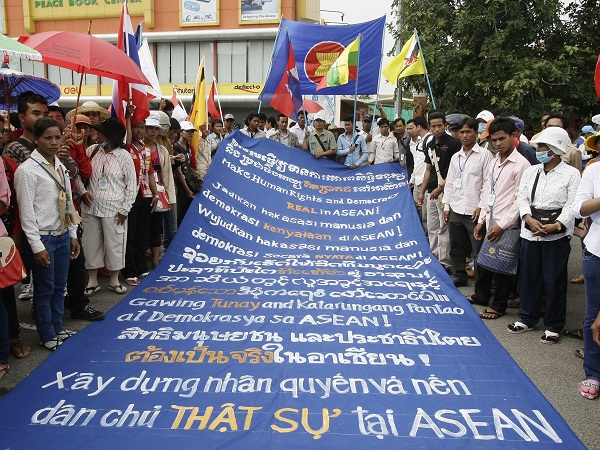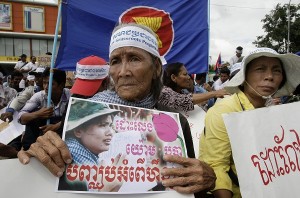
FOR HUMAN RIGHTS AND DEMOCRACY. Cambodian protesters stand surrounding a large poster showing the letters from the Association of Southeast Asia Nation (ASEAN) outside the National Assembly, in Phnom Penh, Cambodia, Friday, November 16, 2012. The letters read “Make Human Rights and Democracy real in ASEAN”. AP/Heng Sinith
PHNOM PENH, Cambodia—It’s only a two-day event, but the Association of Southeast Asian Nations (Asean) summit involves a mind-boggling amount of talk, requiring on average the equivalent of four meetings for each day of the year.
“Do you know how many meetings Asean has in one year from the working group up to the summit? It’s about 1,500 meetings,” Philippine Department of Foreign Affairs (DFA) spokesperson Raul Hernandez told a recent briefing in Manila.
Which is why the Philippines will propose here that the biannual summit of leaders of the 10-country Asean be held only once a year to be more efficient and effective in pushing programs for the good of the region.
Hernandez said the Philippines would raise the matter at the 21st Asean summit and related summits scheduled on Nov.18-20. Cambodia is the host of the 2012 summits, including the 20th Asean summit held in April.
President Aquino attended the April summit, and will return to the Cambodian capital on Saturday for the 21st summit.

A Cambodian protester, center, holds a portrait of detained Yoam Bopha, a Boeung Kak lake villager, during a protest rally outside the National Assembly, in Phnom Penh, Cambodia, Friday, November 16, 2012. Bopha was arrested by local authorities after her protest over compensation for her loss of her house due to a new luxury housing development. The protesters demanded the release of Bopha. AP/Heng Sinith
US President Barack Obama is attending a related meeting between Asean leaders and other regional powers, including China, Japan, Russia and Australia.
Twice yearly
The Asean summit used to be a once-a-year event, but has been held twice yearly, by the same host, since 2009, to accommodate related meetings, among other reasons.
“For the last few Asean meetings, there were always two summits being held—July and November,” Philippine Ambassador to Cambodia Noe Wong said here in an interview with Radio-Television Malacañang.
Hernandez said the Philippines, observing that the number of meetings did not necessarily bring productive results, would move for the review of the Asean charter and propose that the summit be held only once a year.
“We are hoping that Asean could be more efficient and cost effective in coming up with decisions and for pushing programs that would be good for the region. And this is one of those that we are advocating—that there will be only one summit in Asean per year,” he said.
Hernandez said interaction and communication between and among Asean leaders without physical contact were now possible “with all the developments in technology.”
“So we think that by having only one summit per year, the leaders could really focus on what they would like to push through and be able to effectively push whatever advocacies they have that would be beneficial not only to Asean but to the whole of the region and to the world,” he said.
The theme for the Asean summit is “ASEAN: One Community, One Destiny.”
This year marks the 45th year of Asean, which groups the Philippines, the host Cambodia, Singapore, Indonesia, Malaysia, Brunei, Thailand, Burma (Myanmar), Laos and Vietnam.
The summits
To illustrate the number of Asean meetings in a year, the 21st summit actually has several other side summits: 15th Asean-Japan summit; 15th Asean-Korea summit; Asean plus three (Japan, China and South Korea) commemorative summit; 10th Asean-India summit; 15th Asean-China summit; and 4th Asean-US leaders’ meeting (with Obama).
The last meeting is the 7th East Asia summit among the 10 Asean leaders with the eight Asean-East Asia partners—Australia, China, India, Japan, New Zealand, South Korea, the United States and Russia.
Apart from the Asean charter review, the Philippines will “continue to advocate maritime security and cooperation, the West Philippine Sea (South China Sea), people empowerment through migrant workers’ protection and welfare, [and] human rights,” Hernandez said.

